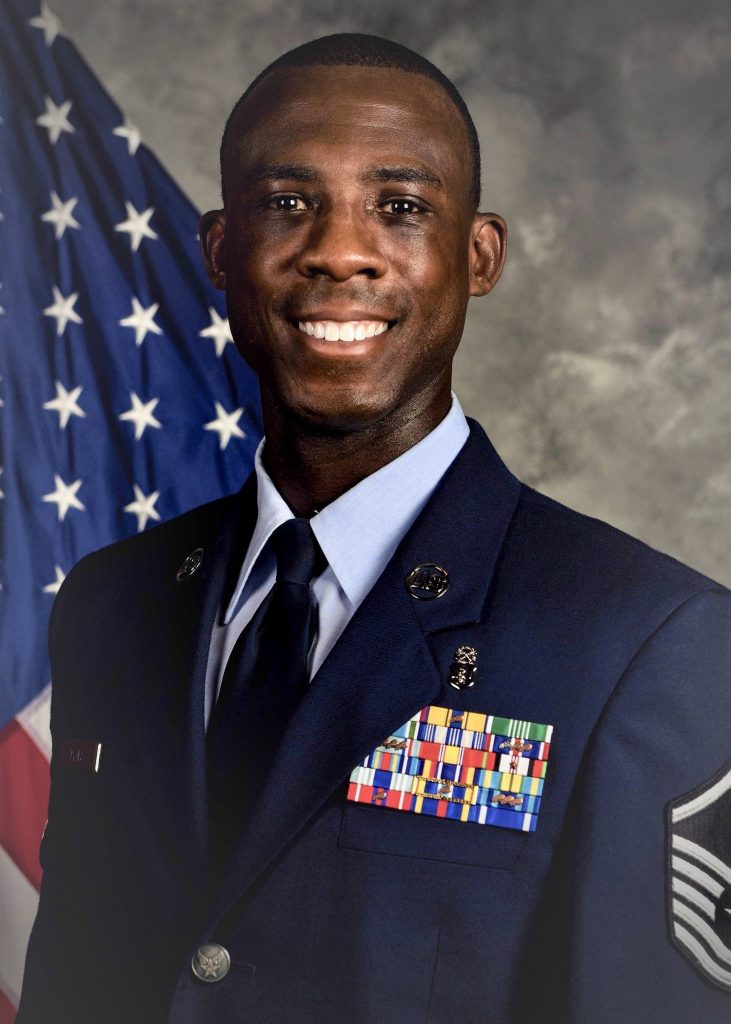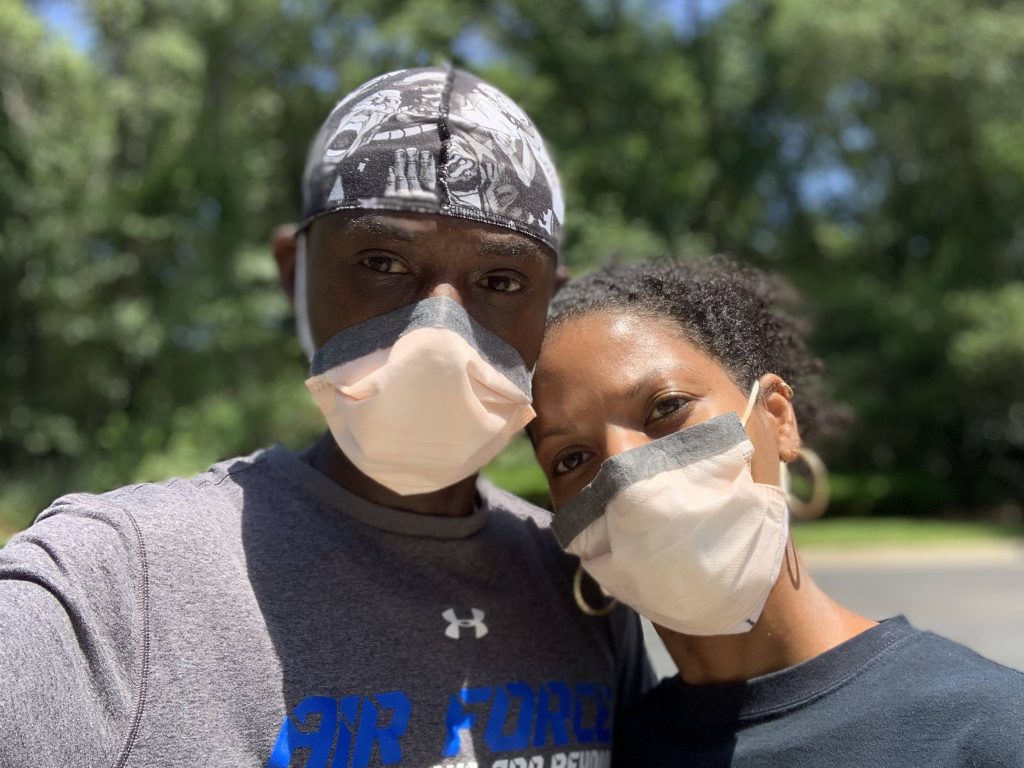
As a career military man, Chris Ryals was used to being physically active. The Air Force master sergeant regularly ran, visited the gym and lifted weights. But in early 2017, he was diagnosed with latent tuberculosis and started on oral medication. Soon thereafter, he began experiencing pain in his feet while preparing for a fitness test. He knew something was amiss.
It was just the beginning of a journey that would lead Chris to Mayo Clinic, and hope through innovation.
"My feet would be killing me. It would hurt to walk," recalls Chris, who was originally diagnosed with plantar fasciitis. Then the pain moved to his knees and shoulders, and Chris' ligaments and tendons were seemingly always tight.
Military doctors diagnosed Chris with scleroderma, an autoimmune disease that affects multiple systems in the body, including the skin, lungs and gastrointestinal track. Scleroderma causes progressive disability and in some cases death. Although rare, the disorder is more common in certain populations, such as African Americans, but it can affect any ethnic group.

"Unknowingly, the latent TB (tuberculosis) medication had caused this underlying, seemingly dormant condition to rear its ugly head," says Chris, who was 39 at the time.
"I'll never forget talking to the rheumatologist, and she was speaking to me, telling me everything, what comes along with the condition. And I just remember looking at her, and then I sat back and repeated the basics of it: 'So I have a condition that has no cure. And it could potentially kill me.' It was a shock," says Chris, a father of two young children.
Over time, Chris' condition worsened. "I dropped a significant amount of weight. I started to have skin discoloration all over my face, and I was always cold. It got to the point where I was unable to reach for things in the cabinet or reach up to adjust the showerhead. It was difficult to do daily activities, like reach down to tie my shoes, or put shoes and socks on," says Chris, who had relocated to Brunswick, Georgia, to be near family.
Journalists: Broadcast-quality video (2:24) is in the downloads at the end of this post. Please "Courtesy: Mayo Clinic News Network."
Last December, at the suggestion of family members – who "always praised about the service and quality of Mayo Clinic health care," – Chris traveled south to meet with Dr. Andy Abril, a rheumatologist at Mayo Clinic in Florida.
"When Chris came to see us, his scleroderma was rapidly progressing, so he came to see what alternatives we had for the treatment. Unfortunately, with this condition, there are not a whole lot of options," says Dr. Abril.
Innovative research
One area of innovation, though, is in autologous bone marrow transplantation, where a patient’s own healthy stem cells are used to replace diseased or damaged bone marrow.
Chris had heard this type of transplant was being investigated for patients with autoimmune disorders. But he says he was still shocked when Dr. Abril recommended he visit with a hematologist. "I was 100% surprised when Dr. Abril referred me to them at the first visit," says Chris, admittedly enthusiastic.
In early 2020, he met with Dr. Ernesto Ayala, a member of Mayo Clinic Cancer Center's Cellular Therapy program. Dr. Ayala was just as excited as Chris about the prospect of a stem cell transplant.
"Autoimmune disorders target people at the most productive stage of life, usually within age 20 and 40, so they have a huge impact. They are complex and difficult to treat in that there are many patients who fail to respond. As the diseases progress, they can become lethal. But the use of bone marrow transplantation, or cellular therapy, has emerged as a powerful alternative to treat these disorders in patients that have failed the standard treatments," Dr. Ayala explains, adding that the treatment is only available at a very few number of centers in the country.
"In the southern United States, Mayo Clinic is the only center that is offering this type of treatment as standard of care for patients with severe autoimmune disorders," Dr. Ayala says.
Chris was admitted to the hospital on April 8. Less than a week later, on April 14, he received his transplant.
Recovery has been slow but well-worth the wait, Chris says. "The biggest improvement was the halt in progression in my condition."

In the eight months since his transplant, Chris has seen his symptoms almost reverse. He's back at the gym working out, his skin has softened, and much of the discoloration on his face has resolved. Gastrointestinal issues also have abated. "I'm hoping to regain weight and strength in the next six months and beyond," Chris says.
For now, Chris, who turned 40 in October, is happy to celebrate the holidays with his family. "No special plans, but (we plan) to celebrate together."
And for Dr. Ayala, that's the best gift. "It's so exciting. I am so happy to see the results of our work. I can see a family together again as a whole, raising their children, going back to work. And to me, it's like the prize of what we do."
Transforming medicine
"In the last a few years, Mayo Clinic in Florida has invested significantly in people, technology and space to be able to expand and lead the treatment of solid tumors and hematological cancers, but also to lead in the development of cutting-edge cellular therapies for other diseases, such as autoimmune diseases and neurological diseases," says Dr. Roxana Dronca, chair of the Division of Hematology and Medical Oncology at Mayo Clinic Florida.
The opening of the Mangurian Building and construction of a biomanufacturing facility are two components of the expansion in Jacksonville that Dr. Dronca says is helping to transform the care Mayo Clinic provides.
"I’m really excited about the development of our bio manufacturing facility that will allow us to develop a more robust research program and also manufacture stem cell and engineered cellular therapies that will be applied for the cure of cancer, but also other complex diseases," she says.
Presently, in addition to scleroderma, bone marrow transplantation is being offered to select patients who have a rare neurologic disease, and for sickle cell anemia patients.
"Seeing the success of this patient really gives me hope that we can continue to learn, and we can continue to advance the medical field and make a difference in the lives of patients, not just with cancer, but with other rare and incurable diseases," Dr. Dronca says.







